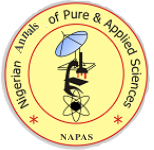Avian Ectoparasitism in Makurdi, Nigeria: Do Wild Birds Serve as Reservior for Domestic Birds?
DOI:
Abstract
This study highlights the possible exchange of parasites between domestic and wild birds. Ectoparasites were collected from domestic birds in three residential areas (Wurukum, North Bank and Logo II) and from wild birds in the zoological garden and Mu forest from August – November 2013. A total of 500 domestic birds (chicken, ducks, turkeys, and pigeons) were randomly sampled from thirty (30) households while a total of 127 wild birds were sampled from the Zoological Garden and Mu Forest. The dust-ruffling method was used to pick ectoparasites from birds. A total of 394 (78.8%) of the 500 domestic birds were infested with 689 ectoparasites. Lice had the highest prevalence of 84.6%, while ticks, mites, and fleas had a prevalence of 3.3%, 7.7%, and 4.4 % respectively. For the wild birds, a total of 80 (63.0%) out of the 127 birds were infested with 674 ectoparasites. Lice also had the highest prevalence of 66.0%, while ticks, mites, and fleas had a prevalence of 4.2%, 13.1%, and 16.8% respectively. Out of the 17 ectoparasite species encountered, six (6) were found in both wild birds and domestic birds. Predominant species of ectoparasites infesting both domestic and wild birds are lice (Lipeurus caponis), mites (Dermanyssus gallinea) fleas (Echidnophaga species) and ticks (Argas persicus). Integration between ecology and veterinary medicine will allow a better understanding of population dynamics of ticks and other ectoparasites as they constantly co-infest avian populations. As long as the role of wild birds acting as reservoirs for the infestation of domestic birds is underestimated, efforts at preventing and controlling ectoparasites of domestic birds and poultry diseases may be a futile venture.



 Contact Us
Contact Us Editorial Team
Editorial Team Join As A Reviewer
Join As A Reviewer  Request For Print Copy
Request For Print Copy


 Cprint Publishers
Cprint Publishers